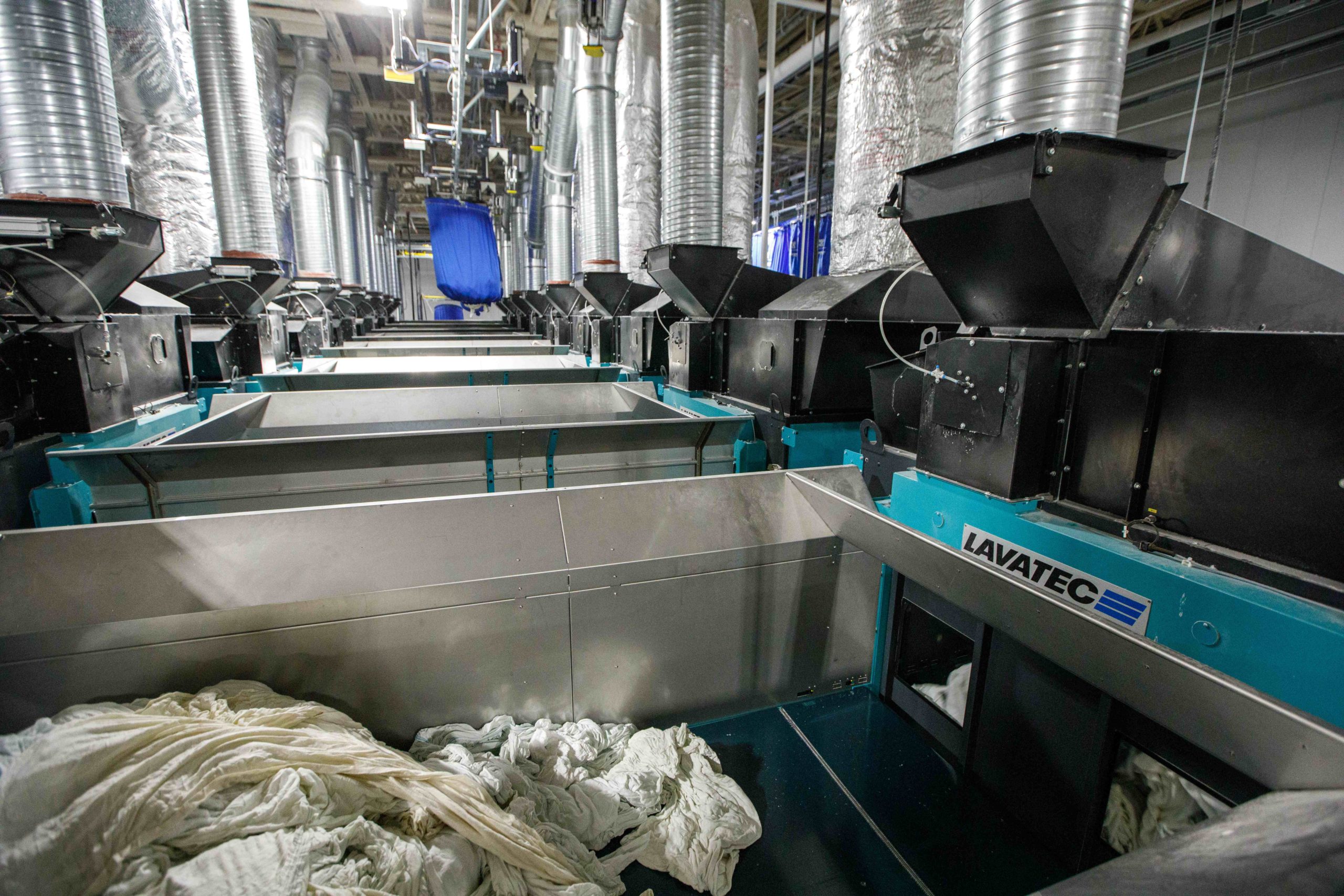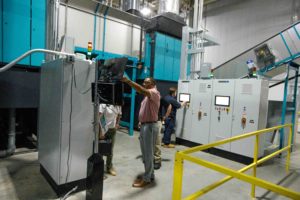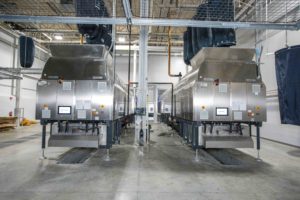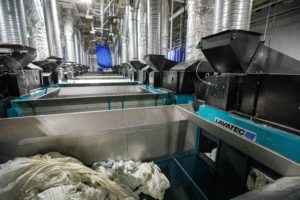
A sure sign of Detroit’s continued rebirth and revitalization is evident only a couple of miles from downtown. Last year, Metropolitan Detroit Area Hospital Services completed construction of a gleaming new, state-of-the-art laundry facility down the street from Henry Ford Hospital on Elijah McCoy Drive.
Fourteen years after first connecting on a tunnel washing system, they selected LAVATEC again and have installed new wash equipment that’s producing more impressive results and generating significant energy savings, according to a news release.
It’s another step in the progression of Michigan’s largest medical laundry facility. A co-operative joint venture among the Henry Ford Health System, Michigan Medicine, and St. Joseph Mercy Health System, MDAHS is the pride of the neighborhood. Their team of approximately 150 employees is responsible for shipping over 2.5 million pounds of linen each month to its members.

Plant manager Nate Adams (foreground) and systems operator Peter Pizzo, check the LAVATEC osLaundry data management system for the latest real time information.
With a history dating back to 1972, MDAHS serviced members from a building on Oakman Boulevard not far from its current home. The business grew steadily and MDAHS built an addition 10 years ago that increased its space to 47,000 square feet. However, at the pace at which MDAHS was growing, it became evident greater capacity would eventually be needed.
The new building is more than double the size at 115,000 square feet. Built with other considerations in mind, the sustainable design features a wastewater heat reclamation system that incorporates eco-friendly cleaning products and recycled materials. The drying portion of the business has its own dedicated room to make the two-shift, five days a week operation more efficient. All areas can be expanded to accommodate future growth, says general manager Dave Haas, who helped guide the transformation.
“The past performance of the LAVATEC equipment certainly played a role in our decision making to purchase their equipment for the new facility,” said Haas, a 17-year veteran at MDAHS who has served in the GM capacity for the past six years.
“During the vetting process for the new wash equipment, we wanted to remain open-minded when accessing the equipment of each manufacturer. At the end of the day, it was the simplicity, longevity, and the short learning curve which drove our decision to purchase the new LAVATEC equipment.”

The simplicity, longevity and prior success were several factors that figured into the decision to purchase new tunnel washers and other LAVATEC equipment.
Right equipment achieves new productivity levels
The original pair of 14-compartment, batch tunnel washers MDAHS installed in 2007 provided it with the opportunity to improve the overall wash quality. It also impacted the timeliness of processing and delivering linen, including surgical garments and mattress underpads that contain water-resistant micro-denier fabric, to their customers. Haas indicated the 110-pound tunnels raised productivity levels two ways. It gave them adequate rinses and the ability to run more pounds of wash per hour due to the single drum at the load and discharge ends, and a double drum in the middle.
On top of the solid engineering, easy operation and simple controls that made the tunnel washers user-friendly, Haas said their water usage decreased significantly during this time by about 25%. Less steam was required since MDAHS switched from steam to gas dryers, and combined with the LAVATEC extraction presses and a centrifuge, it helped reduce drying times and overall energy use. Those numbers served as a catalyst when it came time to determine which equipment needed to be purchased for the new facility, according to the release.
A foundation built from astute planning
From his experience prior to and since joining MDAHS, Haas knew that even well-run laundry operations often experience problems with a lack of drying capacity. The sheer volume of towels, scrubs, blankets and other materials simply take longer to dry than to wash, and that can cause back-ups with the tunnel wash cycles. He moved to eliminate the potential problem by creating a separate room for the drying process.
“At the original building, we had two shuttles and 12 dryers. Over the years of operating this system, we had determined the shuttles were the main source of many faults,” he recalled.
“Moving forward, we knew we had to have a better system. After a discussion with E-Tech, our rail vendor, it was determined the dryer pod system was the best solution for the current state. And it will also allow us to easily expand and accommodate future growth.”
With the plan set, MDAHS ordered from LAVATEC two new and larger 12-compartment, 220-pound continuous tunnel washers, and paired them with new LP583 LAVASPEED presses to feed 16 TT745G natural gas dryers. All of the equipment is monitored by the intelligent LAVATEC osLaundry data management information system.
An overhead monorail system was built to move the wash via eight LAVATEC intermediate transfer conveyors that direct it in either direction for loading to the next available dryer in the separate room. The final stage involves the dryers being unloaded onto a LAVATEC dryer discharge conveyor system that transports the goods via the monorail to the finishing side of the plant.

Since installing 16 new LAVATEC gas dryers, MDAHS has experienced a 27% decrease in natural gas consumption per 100 pounds of processed linen – impressive considering they ship in excess of 2.5 million pounds per month.
The TT745G gas dryers address the need of industrial laundry operations for cost-effective, sustainable solutions. They are manufactured with a specially designed line burner, a full-width heat input duct and infrared technology to more efficiently determine when linen is dry. The end result is decreased drying times and reduced energy consumption, which directly impacts the bottom line.
“The new burners have attributed to a 27% decrease in natural gas consumption per 100 pounds of linen processed,” revealed Haas. “We ship over 2.5 million pounds per month to our members, and we anticipate ending our fiscal year at 32 million pounds.”
In terms of future development, Haas said the facility was designed with a peak capability to handle 78 million pounds of linen annually while operating six days a week. That, combined with the COVID-19 pandemic that arrived 18 months ago, made it all the more imperative to incorporate the osLaundry information system to manage the equipment. The scalable software package provides real-time data that allows management to make critical decisions quicker, helping the workforce to make any necessary adjustments that will improve linen productivity.
“Our volume had significantly decreased during the height of the pandemic, but it steadily increased and has just about returned to normal. Our biggest challenge has been with finding qualified labor,” noted Haas. “As we continue to move forward towards a sense of normalcy, we anticipate the volume to increase. The osLaundry system is used primarily to help us monitor and manage our operation. Working with LAVATEC has been and continues to be a great partnership.”












